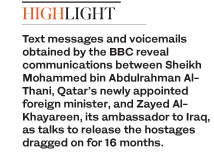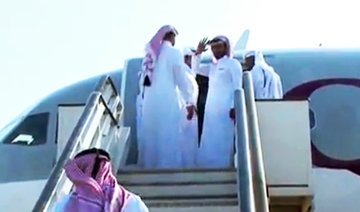LONDON: Damning new evidence has emerged to suggest that a $1 billion ransom paid by Qatar for the release of 28 Qataris kidnapped in Iraq has been used to fund terror.
Text messages and voicemails obtained by the BBC reveal communications between Sheikh Mohammed bin Abdulrahman Al-Thani, Qatar’s newly appointed foreign minister, and Zayed Al-Khayareen, its ambassador to Iraq, as talks to release the hostages dragged on for 16 months. 
In the end Qatar paid the biggest ransom in history: $1 billion plus $125 million in “side payments,” all paid to groups such as Al Nusra Front, the Al-Qaeda affiliate now known as Hayat Tahrir Al-Sham, and the Iran-backed Iraqi Shiite paramilitary group Kataib Hezbollah.
The ransom payment was a key factor in driving the Anti-Terror Quartet — Saudi Arabia, the UAE, Bahrain and Egypt — to close borders and sever diplomatic ties with Qatar.
The 28 Qataris were taken hostage on Dec 16, 2015, while hunting with falcons in southern Iraq, having ignored all warnings about not traveling to the area. The party included members of the ruling family.
The kidnappers were identified as members of Kataib Hezbollah but nothing was heard from them until three months later, when they offered to release three hostages in return for “a gesture of goodwill” — money.
Ambassador Al-Khayareen wrote in a text to the foreign minister: “This is a good sign for us, which indicates that they are in a hurry and want to end everything soon.”
As the months passed, however, the kidnappers kept upping their demands. As well as money they wanted Qatar to leave the Saudi-led coalition fighting the Houthis in Yemen, and demanded the release of Iranian soldiers held in Syria.
One Kataib Hezbollah negotiator, Abu Mohammed, wanted $10 million for himself. “All of them are thieves,” the ambassador wrote to the minister.
Two Iraqi mediators recruited by the ambassador asked in advance for $150,000 in cash and five Rolex watches when they visited Sheikh Mohammed. Who the “gifts” were for was not clear. Qatari officials admit the texts and voicemails are genuine but say they have been edited in a misleading fashion.






















